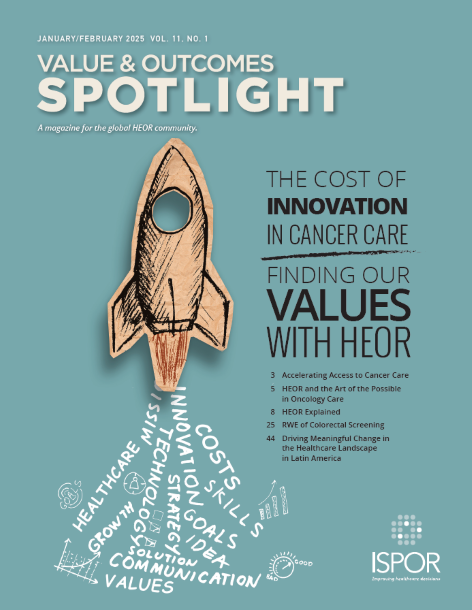Accelerating Access to Cancer Care
 Innovation in cancer care, while a beacon of hope for many, contributes significantly to the escalating costs of healthcare globally. Health economics and outcomes research (HEOR) plays a critical role in shaping oncology care for adults by providing evidence on the cost-effectiveness and value of treatments. HEOR data inform decision makers about the economic implications of new treatments compared to existing standards. This evidence aids in reimbursement decisions, optimized resource allocation, and the creation of value-based care models, ensuring that innovative therapies are accessible while maintaining financial sustainability. By assessing outcomes like quality-adjusted life years (QALYs) and treatment costs, HEOR helps to bridge the gap between clinical efficacy and real-world effectiveness, ultimately guiding policy changes and improving overall patient care in oncology.
Innovation in cancer care, while a beacon of hope for many, contributes significantly to the escalating costs of healthcare globally. Health economics and outcomes research (HEOR) plays a critical role in shaping oncology care for adults by providing evidence on the cost-effectiveness and value of treatments. HEOR data inform decision makers about the economic implications of new treatments compared to existing standards. This evidence aids in reimbursement decisions, optimized resource allocation, and the creation of value-based care models, ensuring that innovative therapies are accessible while maintaining financial sustainability. By assessing outcomes like quality-adjusted life years (QALYs) and treatment costs, HEOR helps to bridge the gap between clinical efficacy and real-world effectiveness, ultimately guiding policy changes and improving overall patient care in oncology.
"Rising costs significantly impact patients, evidenced by nearly half of US patients with cancer exhausting their life savings within 2 years of diagnosis."
The feature article in this issue by Beth Fand Incollingo, “The Cost of Innovation in Cancer Care: Finding Our Values With HEOR,” examines the financial implications of advances in oncology. It highlights the doubling of global oncology spending from $90 billion in 2016 to $193 billion in 2022, driven by both growing populations and expensive therapies. Rising costs significantly impact patients, evidenced by nearly half of US patients with cancer exhausting their life savings within 2 years of diagnosis. The article explores HEOR as a tool for improving cost-effectiveness and equitable access across healthcare systems. Collaborative global efforts, especially in low-income countries, involve early detection and innovative funding models to optimize cancer care. Challenges include aligning drug prices with health value and ensuring that accelerated drug approvals truly benefit patients.
Accelerated approvals, designed to expedite the availability of promising therapies, often rely on surrogate outcomes such as response rates rather than long-term endpoints like overall survival. While this can enable faster patient access to potentially life-saving treatments, it raises concerns about the adequacy of surrogate markers in reflecting true clinical benefits. These approvals might lead to increased scrutiny and the need for ongoing postmarketing studies to validate long-term outcomes. Balancing rapid access with robust evidence is crucial to ensure that treatments not only demonstrate efficacious surrogate outcomes but also translate into meaningful survival benefits.
"Accelerated approvals, designed to expedite the availability of promising therapies, often rely on surrogate outcomes such as response rates rather than long-term endpoints like overall survival."
For example, the Joint Clinical Assessment (JCA) framework, advancing in 2025 at the EU level, aims to harmonize oncology drug evaluations across jurisdictions, improving patient access to care. By providing unified clinical assessment reports, the JCA seeks to streamline regulatory processes and reduce the time between drug discovery and patient availability. This could result in more consistent and rapid access to innovative treatments across participating regions, potentially lowering disparities in healthcare delivery. Additionally, harmonized assessments can drive collaborative research efforts and encourage strategic pricing models that reflect collective purchasing power, ultimately enhancing the efficiency of healthcare systems and promoting equitable access to oncology therapies.
Engaging with key stakeholders to accelerate access to innovative therapies requires a strategic, inclusive approach that emphasizes collaboration, communication, and transparency. Stakeholders include policy makers, healthcare providers, patients, regulatory bodies, and pharmaceutical companies. Developing a multichannel communication strategy, convening stakeholder meetings, and fostering partnerships between public and private sectors can facilitate shared understanding and prioritize patient needs. It is crucial to streamline regulatory pathways without compromising safety to fast-track development and approval processes. Additionally, incorporating patient perspectives early in clinical trials can ensure that therapies align with their needs, potentially improving market access while maintaining focus on equitable healthcare delivery.
The global effort to align cancer care’s economic realities with patient outcomes demands the synergy of real-world evidence and HEOR. This involves the understanding and strategic utilization of economic models, policy frameworks, and data-centric approaches to foster a healthcare environment where innovations in oncology can be sustained and equitably accessed. Ultimately, it is not merely about cutting costs but enhancing quality of life and expanding access, ensuring no patient is left behind due to financial constraints.
As always, I welcome input from our readers. Please feel free to email me at zeba.m.khan@hotmail.com.
Zeba M. Khan, RPh, PhD
Editor-in-Chief, Value & Outcomes Spotlight

